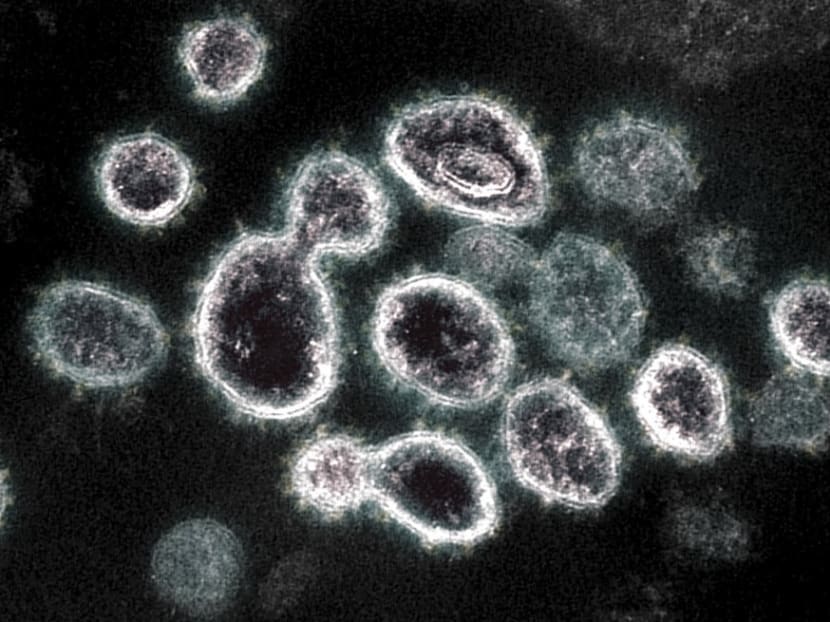Singapore to restrict entry for travellers from 7 African countries as new COVID-19 variant emerges

A transmission electron microscope image of SARS-CoV-2, the virus that causes COVID-19. (File photo: AFP/National Institute of Allergy and Infectious Diseases handout)
SINGAPORE: Singapore will restrict entry to travellers with recent travel history to seven African countries after reports that a potentially more contagious COVID-19 variant may be circulating there, the Ministry of Health (MOH) said on Friday (Nov 26).
From 11.59pm on Saturday, all long-term pass holders and short-term visitors with travel history within the last 14 days to Botswana, Eswatini, Lesotho, Mozambique, Namibia, South Africa and Zimbabwe will not be allowed to enter Singapore or transit here.
The restrictions also apply to those who have obtained prior approval for entry into Singapore.
Singapore citizens and permanent residents returning from these countries will have to serve a 10-day stay-home notice at a dedicated facility.
“There have been recent reports of a potentially more contagious variant of the COVID-19 virus, the B.1.1.529, which may be circulating in Botswana, Eswatini, Lesotho, Mozambique, Namibia, South Africa and Zimbabwe,” MOH said.
“Scientists around the world are still finding out more about the new variant of virus, such as whether it is more transmissible than the Delta variant, whether it is more likely to lead to severe illnesses, and efficacy of existing vaccines against this new variant.”
While Singapore currently has no cases of this variant, "we should take the necessary precautions to reduce the risks" of it spreading here, MOH said.
Related:
South Africa was previously a Category II country with travellers serving a seven-day stay-home notice at their declared place of accommodation after arriving in Singapore. It has now been reclassified as a Category IV country.
The other six are Category IV countries, with arriving travellers with recent travel history to these countries currently required to serve a 10-day stay-home notice at dedicated facilities.
Singapore ranks countries from Category I to IV to determine what type of travel restrictions are put in place.
The new border restrictions will initially apply for four weeks, and MOH will review and extend the restrictions if necessary.
"While the variant has been suggested to be more transmissible, there is currently insufficient evidence to determine if this variant is associated with any change in disease severity, antibody response or vaccine efficacy. These aspects are being investigated," MOH said.
"The Ministry of Health will evaluate the data as it emerges and review our border measures accordingly."
"IMPORTANT PRECAUTIONARY MEASURE": ISWARAN
Transport Minister S Iswaran said on Friday that the move was an “important precautionary measure”, and is part of a “larger strategy and approach” to the reopening of Singapore’s borders.
Of the seven countries listed by MOH, only one – South Africa – has direct air links with Singapore, with one flight a day, he added.
“And even then the volumes are very low, most of them are actually transit passengers going on to other destinations, and a very small number - and I'm informed that it's under 10 a day - actually enter Singapore,” he added.
He noted that Singapore has to be mindful of the situation evolving around the world even as it reopens.
“From the perspective of reopening our borders, as we have always emphasised, even as we take measures to systematically and progressively ... reopen our borders, we have to be very mindful of the situation that is evolving around the world, including in the countries with which we have VTL (vaccinated travel lane) connections,” Mr Iswaran added.
“And of course, countries are also closely studying what's happening in Singapore and our part of the world. And we must expect that in a dynamic situation like this, and with the pandemic evolving, that settings may change.”
Mr Iswaran added that the VTL scheme was designed with multiple “safeguards”. These include the need for travellers to be fully vaccinated in accordance with the World Health Organization (WHO) emergency use listing (EUL) standard and a restriction on the number of travellers.
“We have got several elements here in the design of the VTL scheme that can enable us to calibrate the risk in accordance with the assessment of that point in time,” he said.
“Ultimately, the threshold is determined by the public health risk assessment. And it is something therefore we work very closely with the Ministry of Health on, because our overriding priority is always public health and safety," he added.
"So we want to make sure that that stays the priority ... But there's a range of these levers that we have at our disposal to manage the risk and that's why it is a constant and dynamic assessment of the situation.”



